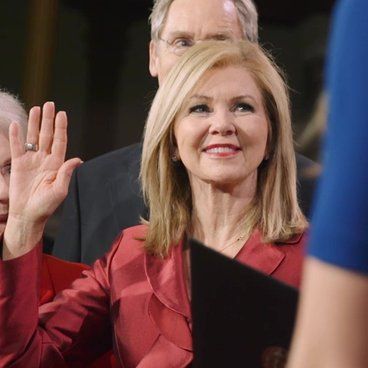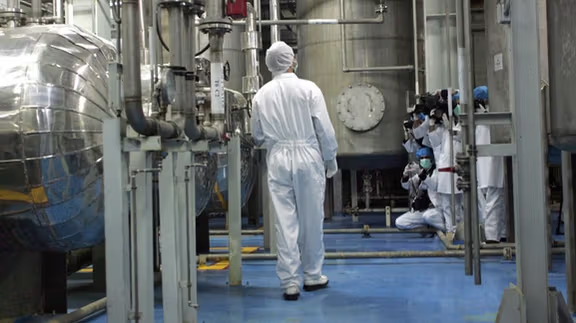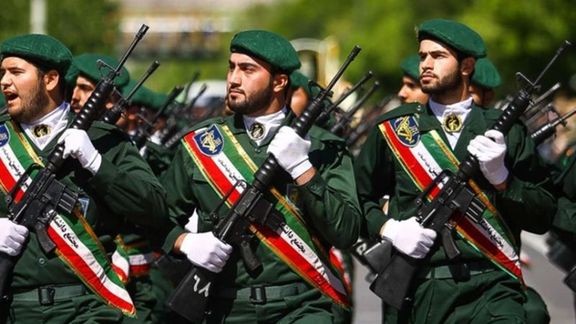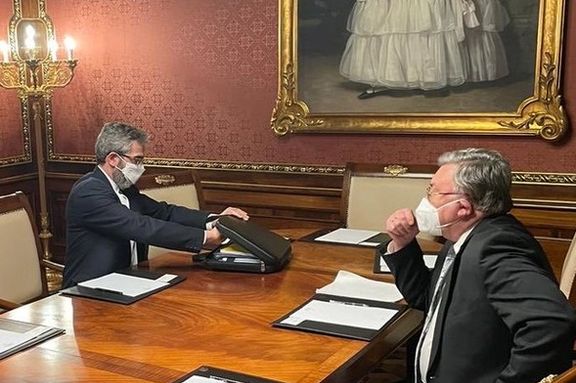Republican Lawmakers Introduce The Iran China Accountability Act

A group of Republican lawmakers have reintroduced the Iran China Accountability Act aimed at prohibiting a nuclear deal until Tehran terminates ties with China and groups like Hamas.

A group of Republican lawmakers have reintroduced the Iran China Accountability Act aimed at prohibiting a nuclear deal until Tehran terminates ties with China and groups like Hamas.
Senator Mary Marsha Blackburn of Tennessee led the legislation jointly with Senators Rick Scott (R-Fla.), Bill Cassidy (R-La.), Marco Rubio (R-Fla.), Thom Tillis (R-N.C.), Mike Braun (R-Ind.), and Ted Cruz (R-Texas), while Congressman Bob Good (R-Va.) introduced the House version of the bill.
The bill is to impose certain requirements for the renegotiation or reentry into the Joint Comprehensive Plan of Action (JCPOA) or other agreements relating to Iran’s nuclear program, until the Islamic Republic can ensure the national security interests of the US and its allies are protected, by terminating strategic, security and military partnerships with China and stopping transfers of cash to proxy forces, including Hamas.
“The Obama-Biden Iran Deal has always been a failure. The Biden administration should not re-enter a deal that legitimizes the Iranian regime — especially while they continue to fund terrorism, endorse Communist China’s dangerous government, and facilitate genocide.
Describing Iran and China as two of America’s greatest adversaries that cannot be trusted, Senator Scott said, Iran chants ‘death to America’ and wants to destroy our great ally, Israel. Communist China will stop at nothing in its quest for world domination. These dangerous regimes, clearly emboldened by President Biden’s appeasement and desperate desire to re-enter the failed Iran nuclear deal, are working to gain a critical foothold in the Middle East.

Pressure is growing on Iran ahead of the United Nations nuclear watchdog’s 35-nation board meeting next week with the agency dissatisfied at Tehran’s cooperation.
France's foreign ministry on Tuesday urged Iran to assuage concerns reiterated Monday over Iran’s pre-2003 nuclear work in a report by the UN’s International Atomic Energy Agency director-general Rafael Mariano Grossi.
Israeli Prime Minister Naftali Bennett Tuesday tweeted several Iranian documents from 2004 and 2005, which he said Israel had acquired, that showed Iran had stolen IAEA classified documents and used the information to “systematically evade nuclear probes.” Bennett also tweeted an animation with green-uniformed, bearded Iranians hiding nuclear bombs from a blond-haired nuclear inspector.
One of the documents released by Bennett is a series of Iranian comments on a September 2005 report by then IAEA director-general Mohamed ElBaradei, which included his analysis of Iran’s -pre-2003 nuclear research. ElBaradei noted that while “good progress” had been “made in Iran’s correction of the breaches” in adherence to the Nuclear Non-Proliferation treaty (NPT), the agency would continue to press Iran for further explanations given its “experiments to acquire the know-how for almost every aspect of the fuel cycle” and “policy of concealment…until October 2003.”
The Iranian comments released by Bennett, in Persian and English translation, expresses Iran’s view that Tehran was under no legal obligation to answer queries it said were unrelated to the nuclear program therefore its commitments under the NPT.
Current IAEA director-general Grossi said in a report this week that Iran had so far failed to meet an agreement, made this March, to satisfy the agency over outstanding issues on this pre-2003 work with written replies by late March and answers to subsequent queries by June 21.
‘Obtained by intelligence measures’
Other documents, dated 2004, attached to Bennett’s tweet refer to ‘confidential’ IAEA material “obtained by intelligence measures,” suggesting that Iran had some prior knowledge of what agency inspectors might investigate.
These include notes on the need to change dates concerning the liquidation of Kimiya Maadan, a company managing a uranium mine, although quite how this affected the agency’s work remains unclear. The Wall Street Journal, which had earlier access to the documents tweeted by Bennett, cited “Middle Eastern intelligence officials” claiming that altering the date “allowed Iran to tell the IAEA that the work on the uranium mine, before May 2003, was done by Kimiya Maadan for the Atomic Energy Organization of Iran, supporting Iran’s assertion that the mine was civilian and separate from any military nuclear work.”
The Journal cited “Middle Eastern intelligence officials and former IAEA officials” that “Iran’s Ministry of Defense built the uranium mine, called Gachin, to be able to produce material for a potential nuclear-weapons program…”
‘Digging up old cases’
The 2005 ElBaradei report, while noting there were “no indications of undeclared mining or milling activities at Gahine [sic],” said the IAEA was “trying to achieve a better understanding of the complex arrangements governing the past and current administration of the Gchine mine and mill…[including] …how a turn-key project for a uranium ore processing plant could have been implemented by a newly founded company…in such a relatively short period of time.”
The purported Iranian comments on the ElBaradei report released by Bennett suggested the agency was “digging up old cases” and noted its interest in Tehran’s alleged “ties with a smuggling network.” Some analysts have long suggested that Iran before 2003 acquired equipment, including centrifuge parts, from the Pakistani nuclear scientist AQ Khan.

Iran’s Tuesday dismissed as “unfair and unbalanced" a report by the UN nuclear watchdog accusing Tehran of lack of cooperation over its past atomic activities.
In a press conference in Tehran, spokesman Saeed Khtibzadeh insisted that the International Atomic Energy Agency’s (IAEA) report disclosed on Monday does not reflect “the reality of discussions between Iran and the Agency.”
The IAEA report expressed dissatisfaction in Iran’s answers to questions over its past atomic activities. Iran agreed March 5 to provide written explanations by March 20 of long-standing issues in its nuclear work before 2003, and to clear up remaining queries by June 21. But the new quarterly report by IAEA expresses dissatisfaction with Iran’s response to agency queries over four sites not declared as part of the nuclear program where inspectors detected traces of uranium.
"Iran has not provided explanations that are technically credible in relation to the Agency's findings at those locations," the report said. Mohammad Eslami, the head of the Atomic Energy Organization of Iran, said in April that Tehran had answered all the agency’s questions.
Khatibzadeh accused the IAEA of “politicizing” the issue and allowing pressures by “Zionists and some activists” to divert the agency’s response from a technical to a political one.
Khatibzadeh also was defiant on the issue of stalled nuclear talks with the United States, repeating Tehran’s position that Washington should make decisions to reinvigorate the negotiations in Vienna,
The diplomatic process was said to be close to fruition in early March when diplomats suddenly stopped the talks and returned to their capitals. One issue that has since been repeatedly mentioned as a major stumbling block is Iran’s insistence that its Revolutionary Guard (IRGC) should be removed from the US list of Foreign Terrorist Organizations (FTO).
The Biden administration has so far refused the demand, specially as domestic and Congressional pressure increased in March and April by those opposed to making concessions to Tehran for reviving the 2015 nuclear deal known as the JCPOA.
Khatibzadeh, however, tried to downplay the importance of the IRGC delisting issue, insisting that more important and all-encompassing is Iran’s economic benefits from an agreement. “Issues that are being negotiated between Iran and America are related to Iran’s potential economic benefits and lifting of all components of US maximum pressure,” the spokesman said.
Tehran has been lately downplaying the IRGC issue in the talks, perhaps partly because of its domestic ramifications amid increasing economic hardships for the average citizen. Iranians know that if there is a nuclear deal, economic sanctions would be lifted, and their living conditions would be improved somewhat. The authorities do not want the IRGC to be seen as the stumbling block to an agreement.
However, the powerful military and intelligence organization is also a major economic player in Iran and even if US oil export and banking sanctions are lifted, hundreds of companies linked with the IRGC would be seen as risky partners for foreign businesses and potential investors.
Besides IRGC’s FTO listing, dozens of companies and individuals linked with the Guards have been sanctioned by the US.
“What we should ultimately gain from an agreement is definite benefits for the Iranian people,” Khatibzadeh said and added, “Issues that remain between us and America are about guarantees, individuals and the cycle of Iran’s economic profits, which need to be implemented.”

A report from the United Nations nuclear watchdog has expressed dissatisfaction in Iran’s answers to questions over its past atomic activities.
Iran agreed March 5 to provide written explanations by March 20 of long-standing issues in its nuclear work before 2003, and to clear up remaining queries by June 21. But a new quarterly report from the International Atomic Energy Agency (IAEA) expresses disquiet with Iran’s response to agency queries over four sites not declared as part of the nuclear program where inspectors detected traces of uranium.
"Iran has not provided explanations that are technically credible in relation to the Agency's findings at those locations," the report says. Mohammad Eslami, the head of the Atomic Energy Organization of Iran, said in April that Tehran had answered all the agency’s questions.
Back in 2015, the IAEA concluded that Iran had operated an “organizational structure” carrying out “feasibility and scientific studies” in nuclear research before 2003, with some aspects continuing until 2009. When Iran agreed in the 2015 Joint Comprehensive Plan of Action (JCPOA) drastically limiting its nuclear program, the agency’s emphasis shifted towards monitoring its compliance with the agreement reached with six world powers.
But the pre-2003 work was revived as an issue by further agency investigations after Israel claimed in 2018 to have stolen a trove of documents from Iran, and by Tehran’s expansion after 2019 of its nuclear program beyond JCPOA limits in response to the United States leaving the deal in 2018 and imposing ‘maximum pressures’ sanction.
A more assertive approach was also taken by Rafael Mariano Grossi, who became IAEA director-general in 2019.
The IAEA quarterly report comes with negotiations paused between Iran and world powers over restoring the JCPOA as US sanctions continue and Iran develops its nuclear program. A separate IAEA report put Iran’s stock of uranium enriched to 60 percent up 9.9kg to 43.1kg, with the agency calling this a “significant quantity,” given it could be further enriched relatively easily to the 90 percent required for a crude nuclear weapon.
Iran in early 2021, following the killing of scientist Mohsen Fakhrizadeh and the continuing of ‘maximum pressure,’ scaled back cooperation with the IAEA almost to that required under the Nuclear Non-Proliferation treaty, and subsequently raised its level of enrichment to 20 percent and then 60 percent, far above the 3.67 percent cap set by the JCPOA.
The IAEA board is due to meet next week, and may face pressure from the United States to in censure Iran. Grossi has managed a series of ad hoc arrangements over access to the Iranian nuclear sites but has consistently argued that the agency’s role would be best performed with “political circumstances” overcome and the JCPOA back in place. The European Union, which alongside Russia and China, criticized the US leaving the JCPOA, has led diplomatic efforts to restart talks.

An Iranian lawmaker who was Tehran’s security commander as an IRGC general, says "We do not insist on delisting the IRGC as a terrorist group. But the United States should behave logically."
Asked during an interview with Didban Iran website whether the US decision not to delist the IRGC means the end of the nuclear deal with Iran, the Joint Comprehensive Plan of Action (JCPOA), Esmail Kowsari said: "We have set a framework for the nuclear negotiations. America jumping up and down will not affect our decision."
Talks to revive the JCPOA in Vienna came to an abrupt stop in March, reportedly for Iran’s insistence that the IRGC be removed for the US list of Foreign Terrorist Organizations (FTO).
Kowsari added, "The time is over for America's jingoism and irrelevant responses. It is now the United States' turn to give us a logical response."
He further said that "We know that it was not Biden who added the IRGC to the FTO list, but we also know that it was Trump, the evil one, who imposed the sanctions on Iran and pulled out of the deal with us."
Kowsari also suggested a solution for the diplomatic impasse: "If Mr. Biden wants the nuclear negotiations to revive the JCPOA to be fruitful, he needs to lift those sanctions and delist the IRGC. It is in that case that we can reach an agreement about our relations."
However, the former Revolutionary Guard general who is now a lawmaker from Tehran reiterated that "Nothing will happen to the Islamic Republic, and we will continue what we are doing if Biden refuses to delist the IRGC. In this case the talks over the revival of the JCPOA will remain inconclusive."
He added, "We have shown our honesty and remained loyal to our commitments. If the United States refuses to fulfil its commitments the whole world will realize that the Americans are criminals."
Elsewhere in his remarks, Kowsari said he was not aware of the attack on the Parchin base southeast of Tehran during which an Iranian officer was killed. He said: "I am not a member of the national security committee of the Majles [parliament] and no one briefs me on developments like that."

Meanwhile, the moderate news website Rouydad24 pointed out in a report on Sunday that the US President's refusal to delist the IRGC is the main obstacle on the way of reviving the nuclear negotiations with Iran and subsequently reaching an agreement between Tehran and Washington.
This comes while in less than ten days, the International Atomic Energy Agency (IAEA) is slated to publish is seasonal report on Iran's nuclear activities. Without further elaborating on the issue Rouydad24 said there are no good news coming from the IAEA about its upcoming report.
In the meantime, according to Wall Street Journal, based on Middle East intelligence officials and documents reviewed by the Journal, "Iran used secret records of the United Nations International Atomic Energy Agency, the IAEA, nearly two decades ago to skirt investigations into its nuclear program and hide suspected work on nuclear weapons."
The resulting pessimism about the future of Iran's nuclear case, has led some media outlets in Iran, including the reformist Mostaghel (Independent) dailyto believe that Iran's nuclear case will be handed over to the UN Security Council.The daily quoted political analyst Jalal Sadatian as saying, "This will be the beginning of a dangerous phase in the course of Iran's nuclear case."

The Biden policy of not enforcing Iran oil sanctions has led to a misperception in Tehran that there is no need for a nuclear agreement, a website in Iran says.
The Iran Diplomacy website (not secure for a link), close to the foreign ministry in an article penned by Mehdi Bazargan, a journalist on Saturday wrote that the Islamic Republic hardliners have concluded that by exporting close to one million barrels of oil per day at prices above $100 a barrel, Iran can generate enough income equal to a full export volume, without a need to agree to the revival of the Joint Comprehensive Plan of Actions, JCPOA.
After former US president Donald Trump pulled out of the Obama-era deal in May 2018 and began imposing oil sanctions on Iran, crude exports dropped from above two million barrels a day to less than 300,000 in 2019. The drop came at a time when oil was much cheaper and left the Islamic Republic with a serious shortage of foreign currency to finance its imports.
This led to an immediate rise in inflation rate and a historic drop in the value of Iran’s currency, with a deep recession gripping the economy for at least two years.
Nevertheless, Tehran refused to negotiate with the Trump administration, which was not bashful to call its sanctions ‘maximum pressure’ and make comprehensive demands for a drastic change in Iran’s behavior.
Things changed in September 2020, when during the US presidential campaign, the Democratic candidate Joe Biden penned an op-ed on CNN’s website announcing that his administration will return to the JCPOA and lift sanctions.

Still Tehran refused to directly negotiate with Washington as multilateral talks began in Vienna in April 2021 to restore the nuclear deal.
Already, in the closing months of 2020 reports began to emerge that Iran’s illicit oil exports to China had increased. Beijing might have concluded that Biden was less likely to penalize third parties for quietly breaking US sanctions.
This was followed by more reports of higher Iranian crude exports in 2021. By early 2022, it was safe to say that Tehran was selling just under one million barrels of oil, most to China but probably also to others such as India.
Bazargan argues that the Iranian leadership perhaps sank deeper in miscalculation as the invasion of Ukraine began and they assumed that with a looming energy shortage they can extract more concessions from Washington – and if not, they could sell enough oil at high prices to survive, given Biden’s unwillingness to enforce Trump’s sanctions.
The talks in Vienna were said to be nearing success in early March when the diplomatic process came to an abrupt pause two weeks after the invasion of Ukraine. Statements by various sources, including Iranian officials showed that one major impediment in the talks was Iran’s demand that its Revolutionary Guard (IRGC) be removed from the US list of terrorist organizations. Subsequently, members of the US Congress began expressing serious objections and blaming the administration of willingness to make too many concessions to Iran. The White House has reportedly decided not to accept Iran’s demand and the nuclear talks remain in a stalemate.
However, the administration still insists negotiations are the best way to force Iran to curtail its nuclear program but has made references to a tougher enforcement of sanctions if the current stalemate continues.
The Iran Diplomacy article says more enforcement of sanctions has already begun and cites the seizure of Iranian oil from a stranded tanker near the Greek coast this week.